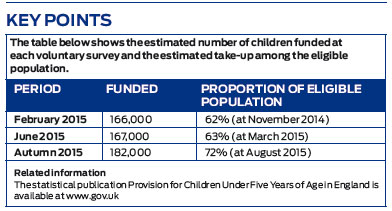
Nearly three-quarters of the most disadvantaged two-year-olds are receiving 15 hours of free childcare after a nationwide push, government figures suggest.
Rates increased from just 58 per cent of eligible children in June last year to 72 per cent in September, according to the Department for Education.
The hike means take-up of the entitlement is on track to meet the target of 73-77 per cent. An estimated 182,000 nursery places are currently being funded.

Around 250,000 children are currently entitled to the 15 hours, representing around 40 per cent of two-year-olds in England.
The number of eligible children has dropped from 260,000 in 2012, which James Hempsall, national support director of the DfE-funded Achieving Two Year Olds programme, said was due to fluctuations in family circumstances.
The Government doubled the provision from 20 per cent of the age group in September 2014 in a scheme worth at least £2,500 to individual households annually.
The criteria include a parent in receipt of Working Tax Credit, with an annual gross income not exceeding £16,190; statemented children; and those entitled to Disability Living Allowance.
The table below shows the estimated number of children funded at each voluntary survey and the estimated take-up among the eligible population.
The analysis of numbers submitted voluntarily by all 152 local authorities over seven weeks last autumn was published this month by the DfE as part of an annual report on ‘Provision for Children Under Five Years of Age’.
The report said official statistics due in June will be calculated differently, though the current numbers ‘provide an indication of the likely trend in take-up’.
However, a need for caution was signalled by a National Audit Office report published last week (2 March). The Government’s spending watchdog warned the 30-hour extension for older children could lead to nurseries cutting back on offering places to more expensive two-year-olds.
But Mr Hempsall described the improvement in take-up as ‘tremendous’, and he credited a ‘maturing strategy’.
He added, ‘Local areas have worked really hard to raise their take-up. In London alone there was an 11 per cent increase.
‘Outreach work has been good but there have been lots of areas taking the opportunity to review and check their delivery, and sometimes they have identified opportunities for better collaborative work with children’s centres and other partners.’
Neil Leitch, chief executive of the Pre-school Learning Alliance, said the take-up increase was ‘encouraging’, but added, ‘Given this trend, it is vital that the Government looks to tackle the issue of capacity in the early years sector as a priority ahead of the introduction of the 30-hour offer for three- and four-year-olds.
‘As highlighted by the National Audit Office report, providers facing a squeeze on places as a result of the extended offer may be forced to limit their number of funded two-year-old places.
‘Supporting providers to respond to this increased demand will be vital to ensuring the long-term success of both schemes.’
DEPRIVED AREAS OF LIVERPOOL SEE RISE
Liverpool City Council cracked its own low uptake of the 15 hours entitlement after hiring a specialist social enterprise company to do outreach work.
The local authority had struggled to fill more than a third of its 3,000 free places despite a year-long push. But when the effort was focused – involving the use of ‘local champions’ who campaigned in the city’s most deprived areas – an extra 187 two-year-olds were signed up in just six weeks.
The Derbyshire-based company, called Outreach Solutions, used techniques including a poster and leafleting campaign in local shops.
The organisation said there was further anecdotal evidence of momentum with take-up continuing to rise.
Across the target areas of Clubmoor and Norris Green in north Liverpool and Yew Tree and Knotty Ash Children’s Centre in the east (see box), the number of children taking up free places rose 17 per cent to 73 per cent. It has played a part in boosting participation across the city from 54 per cent to 71 per cent.
Jan Gallagher, early help service manager at the local authority, said, ‘It demonstrates the value of a tailored approach that engages communities and involves them in championing the importance of early years learning.
‘The programme has really energised communities to raise awareness of free childcare for two-year-olds and this should continue to push up participation rates in those areas in the future.
‘We have particularly valued the insight generated through the programme, which will be invaluable in helping us to develop our communications approach and tailor our messaging to the right audiences in parts of the city where take-up has been low.’
Funds from the city’s two-year-old places grant were used for the initiative and Ms Gallagher said they needed a ‘more innovative approach’ that went ‘deeper than the usual PR publicity campaigns’.
She continued, ‘We had tried all other approaches, had nothing to lose, and had to increase take-up in order to not only ensure we received future funding based on actual take-up – but, more importantly, so that eligible children did not miss out on their entitlement.’
‘COMMUNITY SPIRIT’ IN LIVERPOOL
 Tina Giannasi, an outreach worker based at the Yew Tree and Knotty Ash Children’s Centre in Liverpool, was in a team of three ‘local champions’ who used a network of up to 60 local shops such as convenience stores and pharmacies to spread the word.
Tina Giannasi, an outreach worker based at the Yew Tree and Knotty Ash Children’s Centre in Liverpool, was in a team of three ‘local champions’ who used a network of up to 60 local shops such as convenience stores and pharmacies to spread the word.
Ms Giannasi said she lives in the area targeted, meaning she could do old-fashioned legwork – checking on progress and becoming a familiar face while the initiative ran between June and September last year.
She added that she had been able to draw on the area’s ‘community spirit’, though there were some who did not want to help. She continued, ‘In the areas I’m working in, people are quite deprived. A lot of them won’t open the door to you, some do. Our uniforms look like we’re housing.
‘This scheme was more about targeting the shopkeepers. I live in the local area so if people see me chatting in the local community, they’re less afraid to be approached.
‘It’s about how you approach them. If I see people with prams I’ll speak to them. If they haven’t, I ask, “Do you have children?” Most people will chat.
‘The shopkeepers were quite engaging and happy to chat or distribute leaflets.
‘I’ll say things like, “You said you’d put that poster in the window, where is it?”, or, “I can’t see my leaflets.”
‘It’s like a jokey approach. They might say, “It’s been dead [in the shop]”, or, “Yeah, I did tell one of the mums the other day.”
‘To the mums, I might say, “Would you use the free places?” and they might say, “I think they’re too young.” You can get an understanding of why they don’t go.
‘Some people take up everything because it’s free – some people won’t because it’s free.
‘Parents with other children might not want to lose that time with their children.
‘One mum did go for the free place, but by the time you’ve taken the others you want those precious moments, so she didn’t want to do it.
‘It depends how it works with the nursery. If it’s just 9-12, that’s not long enough to go and do everything before you have to go back and pick them up.
‘Some might want to home-school, think they’re doing a good job. Some are like, “Great, you want to give me 15 hours.”’
Asked about how she felt about the difference she had made, Ms Giannasi said, ‘These free hours can give the child a good head start, they can learn the social skills, understand colours and words in a structured way, sharing things that they wouldn’t do if they were home alone.
‘If they engage, it helps [to overcome] deprivation.’
Ms Giannasi added, ‘It’s about word of mouth. My boss says I talk too much and that’s why she kicks me out to let it all out. She says she can tell when I haven’t spoken to someone. I like to chat.
‘If my job was just giving out leaflets, it would bore me.’









